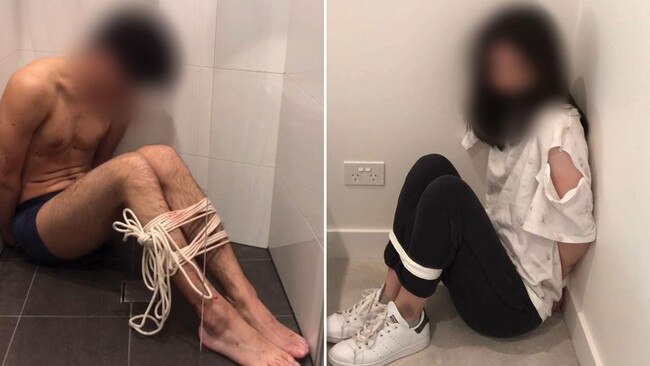Chinese students tied up in ‘kidnapping’ scam to extort millions: NSW Police
Dramatic images of ‘kidnapped’ Chinese students in Australia have been used to extort millions of dollars from family members, NSW Police say.

NSW police have released dramatic images of Chinese students tied up in “kidnapping” incidents that have been used to extort millions of dollars from family members.
Eight incidents of “virtual kidnappings” have been reported to the NSW Police Force, targeting Chinese international students and scamming $3.2 million in ransom payments.
“Incidents of a similar nature have been reported to international law enforcement agencies and netted millions of dollars from victims around the world,” NSW police said in a statement.
Virtual kidnappings were a “sophisticated extortion scam“ involving young victims faking their own kidnappings following phone calls from fraudsters.
Ransom payments were then demanded for their safe release from relatives.
“Investigators have been told that initial contact is made through a phone call from someone usually speaking in Mandarin and claiming to be a representative from a Chinese authority, such as the Chinese Embassy, Consulate or Police,” police said.
“The caller then convinces the victim that they have been implicated in a crime in China, or that their identity has been stolen, and that they must pay a fee to avoid legal action, arrest or deportation.”
Scammers used technology to mask their physical locations and encouraged victims to communicate through encrypted applications such as WeChat and WhatsApp.
Victims fake kidnappings
“The victim is then threatened or coerced into transferring large amounts of money into unknown offshore bank accounts.
“In some instances, victims are convinced to fake their own kidnappings – known as a ‘virtual kidnapping’.
“Scammers instruct victims to cease contact with their family and friends, rent a hotel room and take photographs or video recordings that depict them bound and blindfolded. These files are then shared with the victim’s relatives overseas.
“When the victim’s parents are unable to establish contact with their child in Australia, they send large ransom payments in exchange for their ‘release’.
“The caller will continue to make threats and ransom demands until they are unable to obtain any further payments, often resulting in the victim’s family making contact with police.”

Payments up to $2m
Detective Chief Superintendent Darren Bennett said the eight known instances of virtual kidnappings involved ransom payments being paid ranging from $20,000 to $500,000 and in one case $2m.
Police were working with the Chinese Embassy and Chinese Consulate in Sydney to warn the community of the scams.
“Virtual kidnappings are designed to take advantage of people’s trust in authorities and have developed considerably over the last decade by transnational organised crime syndicates,” Chief Superintendent Bennett said.
“While these phone calls appear to be random in nature, these scammers seem to be targeting vulnerable members of the Chinese-Australian community.
“NSW Police have been assured from the Chinese Consulate-General in Sydney that no person claiming to be from a Chinese authority such as police, procuratorates or the courts will contact a student on their mobile phone and demand monies to be paid or transferred. If this occurs, it is a scam.
Don’t respond to demands: police
“While we are working with our law enforcement colleagues to investigate the origins of these scams, we are urging the community to heed our warnings not to respond to the caller’s demands.”
Macquarie University Pro Vice-Chancellor International, Nicole Brigg, said universities were aware of the scam calls, and students could do “two important things to protect themselves”.
“Firstly, be aware they exist and secondly, ask for help early if they think it might be happening to them or someone they know.”
Australian Competition and Consumer Commission’s June 2020 Targeting Scams report said the “Chinese authority” scam caused the highest losses of all government impersonation scams for 2019.
Scamwatch recorded 1172 reports of “Chinese authority” scams last year, with a total loss in excess of $2 million.
`Virtual kidnapping’ cases reported to police this year include:
■ On Wednesday 22 April 2020, officers from Ryde Police Area Command commenced an investigation following contact from a university in Sydney’s northwest, concerned for the welfare of a 20-year-old female student. Police were told family members in China believed the woman had been kidnapped and that $300,000 had been paid following ransom demands from a caller purporting to be Chinese Police. Following inquiries, the woman was located safe and well at a home at Chatswood about midday on Thursday 23 April 2020.
■ Officers from North Shore Police Area Command commenced an investigation following reports a video of a 22-year-old woman, who was bound and blindfolded, had been sent to family in China via WeChat about 12.30pm on Saturday 30 May 2020. Police were told that the family had paid $20,000 following ransom demands for her safe release. Following inquiries, detectives located the woman at a hotel at North Sydney safe and well about 1am the next day (Sunday 31 May 2020).
■ About 12.45am on Wednesday 17 June 2020, officers from St George Police Area Command received a phone call from man in China who reported that he had received a video of his Sydney-based daughter at an unknown location and that she was bound. An investigation was commenced, and the 22-year-old woman was located safe and well at a hotel at Hurstville just after 1am. Police were told that more than $2 million had been paid following ransom demands by a caller purporting to be Chinese Police.
■ About 10am on Tuesday 14 July 2020, officers from Ryde Police Area Command received a report that a 21-year-old woman had been kidnapped. The woman’s housemate contacted police after her parents were sent a video of her pleading for help at an unknown location and were unable to contact her. Following inquiries, officers located the woman safe and well at a hotel at Pyrmont about 10pm the same day. Police were told that $100,000 had been paid by the woman into an offshore bank account following demands by an unknown caller prior to the ‘virtual kidnapping’.




To join the conversation, please log in. Don't have an account? Register
Join the conversation, you are commenting as Logout